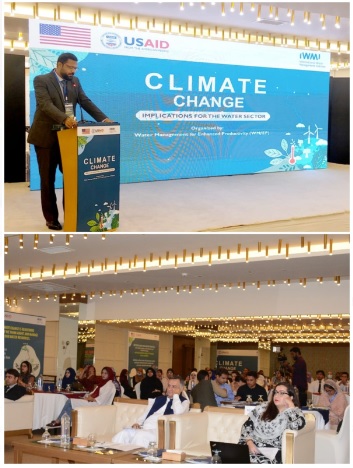By Ali Imran
ISLAMABAD: The experts at one-day conference on Monday underlined that if the glaciers continued melting at a faster pace in the northern areas of the country then the mighty River Indus would dry and become a seasonal river leaving over 240 million lives in jeopardy.
The International Water Management Institute (IWMI-Pakistan) in collaboration with the United States Agency for International Development (USAID), organized a comprehensive workshop and panel discussion titled “Climate Change: Implications for the Water Sector here with a wide range of participants including experts, academia, researchers, students and the media.
The experts during the panel discussion were of the view that water availability was not an issue for the country but rather its governance and conservation was highly significant.
The weather patterns and rain spells were shifting and increasing in magnitude that provided a potential opportunity to embrace rainwater harvesting, and preservation as an alternate to urban flooding and water scarcity to recharge groundwater aquifer, they added.
Commencing the workshop,Chief of the Party of the Water Management for Enhanced Productivity initiative (WMfEP) at IWMI Pakistan, Dr. Azeem Ali Shah in his opening remarks highlighted the achievements and challenges associated with water governance and productivity initiatives in the region.
Development Specialist, USAID-Pakistan, Muhammad Nawaz emphasized that the policy frameworks and legislation intended to address water and climate change issues should be based on scientific evidences and thorough studies as otherwise it would be shooting arrows in the dark.
“In 2022, initially temperature shoot up and suddenly dropped resulting in heavy downpour that was 87 percent heavier than country’s average rainfall. These abrupt changes refer to climate change,” he added.
During the panel discussion, Researcher IWMI Dr Novaira Junaid said Pakistan was the fifth largest country in terms of population with a growth of 2.4 percent per annum and after its first ever digital census the total population accounted for 241.49 million masses.
The growing population at an alarming scale was aggravating the global warming impacts in the region, she added.
Dr Novaira said increasing population was putting pressure on the environment and livelihoods leading to economic breakdown which demanded the country to opt for the short, medium and long-term efforts to mitigate climate change impacts. Dr Azeem Ali Shah discussed water governance issues and termed it a triple looming process, however, the 6th Sustainable Development Goal (SDG-6) was related to Water and Sanitation.
“Water is crucial for achieving SDGs targets as the Chair of UN-Water said, ‘If we failed to achieve SDG-6 by 2030; we would risk the success of all other SDGs.” Dr Shah noted that the government’s ambition and plans needed to be long-term for yielding positive outcomes in the domain of water management and governance. Gender Expert, Khadija Begum said the differential impact of climate change on countries and people is impacting both nations and states variably. “Women more vulnerable during climate-induced disasters as women roles and responsibilities enhance with increased workload during disasters leading to education drop out of girls, risk to sexual violence rise against girls and many other associated threats,” she said,
“Women comprised of 68 percent of agricultural workforce of Pakistan that loose their livelihoods during floods and disasters. Women should have a strong voice in climate adaptive policies which would enhance their access to resources and build climate resilience,” she said. Water Management Expert, Dr Shahid Iqbal said the country had 2.4 percent population growth rate which demanded the country to expand its agriculture and water resources. However, since 1950-2020 a 0.89 degree Celsius temperature had already increased in Pakistan, alongwith a degree Celsius temperature rise in its glaciated region in the north. He insisted that the country never focused low hanging fruits like carbon credits to trade its sequestered carbon stocks as an alternate tool to enhance the country’s climate resilience.
He underscored that the Indus River would loose its might and grandeur if all glaciers melt by 2050. “Pakistan has the world’s largest river water of Indus and it only stores 10 percent of its total water whereas in the US, almost 467 percent of the Colorado River’s total water conserved which is huge,” he added. Climate Remote Sensing Expert, Prof. Dr Hammad Gillani said there was a need to bridge gap between researchers and policy makers for well-informed legislation. The world has changed and there were knowledge sharing platforms, access to data through open data sets had increased which provided ample opportunity to hold international standard researches, he added.






